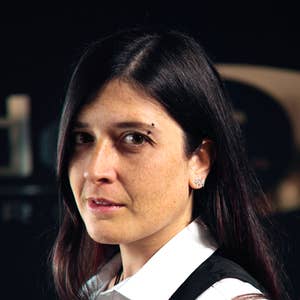"I spent years trying to find ways not to end up crunching"
With a clear goal, however, "very brief periods" of crunch can benefit the product and the team, says Eidos Montreal's Fleur Marty
Nobody would argue that the extremes of crunch are a good thing, but short, controlled bursts of intense work can benefit both the product and the spirit within the team.
That was the view put forward by Fleur Marty, who has worked as a producer at Eidos Montreal for more than three years, most recently with the Deus Ex live team. Marty's talk, which was delivered at the Ludicious Games Festival in Zurich last week, contained a broad range of production tips for teams of all sizes, but one particular slide gave her pause.
Crunch. "That's a difficult one," she admitted, but perhaps not in the way one might immediately think. "I used to consider crunch as my personal failure," she continued. "I used to think that, when we had to crunch, as a producer I had failed my team. I spent years trying to find ways not to end up crunching.

"My mind has changed a bit in the past years about that. I feel that some level of crunch can be good for the team, and good for the project, given a few terms."
Marty's "terms" are key to the point she wanted to make to the crowd, which was largely composed of independent developers working with small teams and tight resources. The worst excesses of crunch are wrong under any circumstances, she said, but those are the extremes.
"If your team is working 80 hours a week for months, coming in at the weekends and working nights all the time, there's something wrong," she said. "It's over-scoped, it's under-resourced, the plan isn't right, something needs to change.
Which leads to the first of Marty's terms: "The crunch should be for very short periods... One or two weeks of crunch? That can be really good."
Marty's team at Eidos Montreal works in "two week spurts," so it's generally clear ahead of time when one of those periods of crunch might be productive. "First you try to readjust the plan, and work really hard so people don't have to crunch," she said, but, "at some point, you can see that the milestone you're trying to hit, it's not gonna be enough."
"I feel that some level of crunch can be good for the team, and good for the project"
Which leads to the second of Marty's terms, which is very much contingent on the first. A controlled burst of crunch can be a positive thing if - and Marty placed huge emphasis on that word - "everybody knows why you're crunching." For crunch to be successful it needs to have specificity, Marty said, a cause for the team to rally around. "You're crunching to hit a milestone, to deliver a demo, to finish a feature that you want to playtest and iterate on.
"Everybody needs to know why you're crunching, and they need to believe in the plan. If you tell them they're gonna crunch like crazy for two weeks, they're gonna come in on the weekends and spend their nights [at work]...and they don't believe that's enough for delivering what you're asking of them, you're screwed. The team needs to buy into your plan."
During these periods, Marty remains in the office with her team, despite not being involved in the bulk of the work. "I live with them," she said. "I'm useless - I'm in the corner, I order the food - but I stay with and support the team." This is all part of the relationship that must exist for these brief bursts of intense effort to make sense, and even seem beneficial to those involved.
"I think, if your team has enough ownership of what they're doing, they're the first ones who will say, 'Let's stop removing features from that milestone. We can do it.'
"If they trust you, and they trust your plan. That's a relationship you have to build."
GamesIndustry.biz is a media partner for Ludicious 2017. Our travel and accommodation costs were provided by the organiser.








